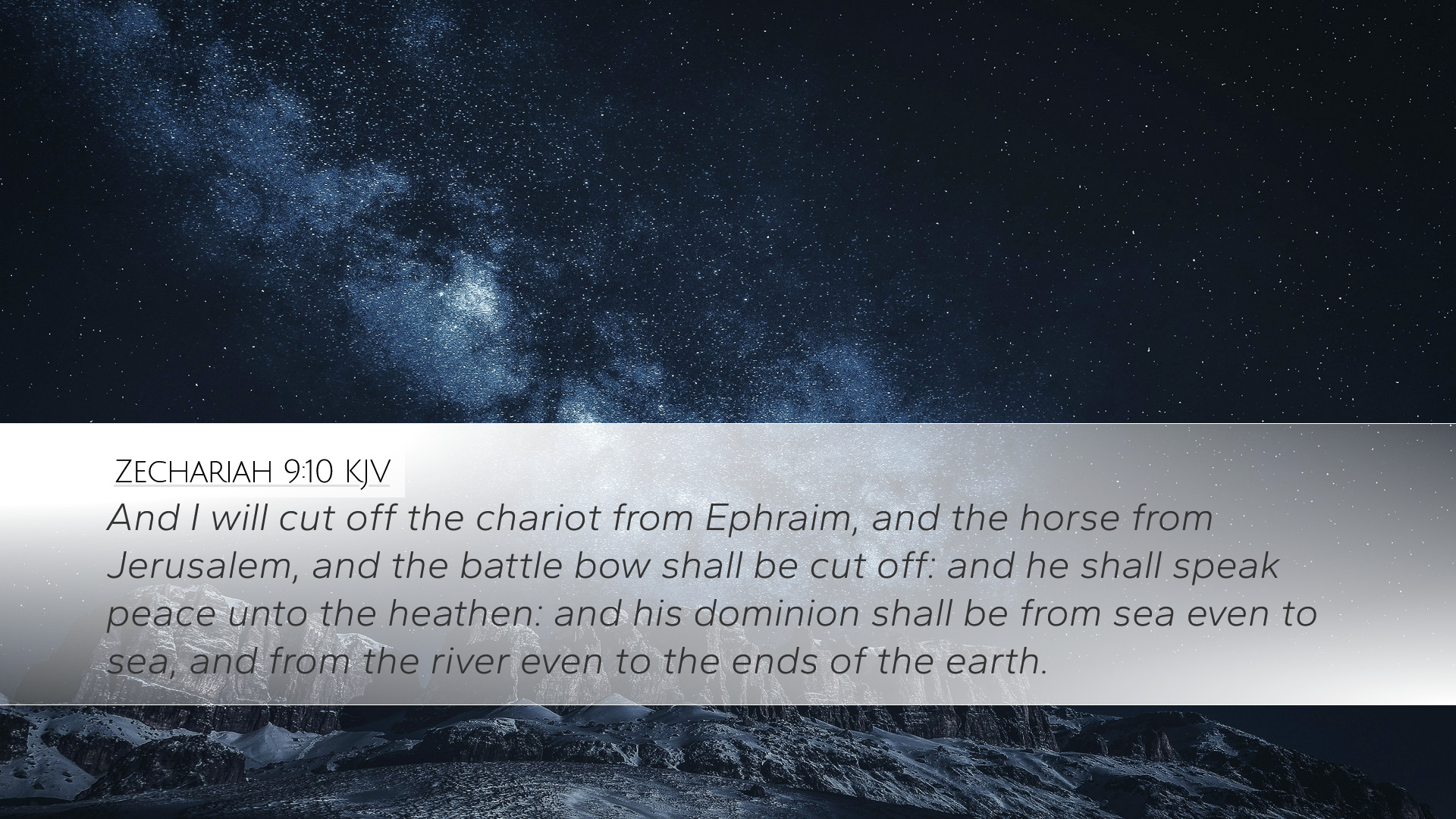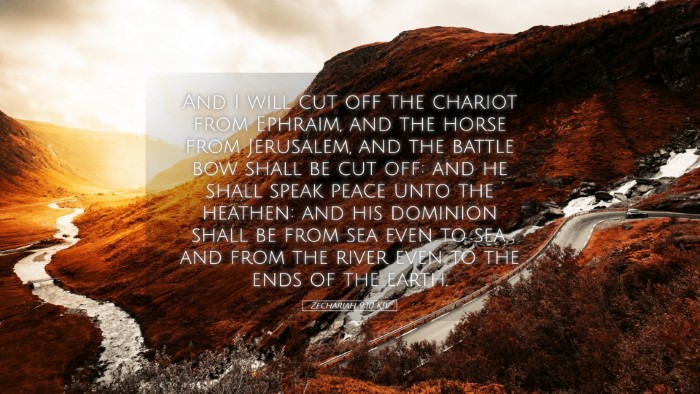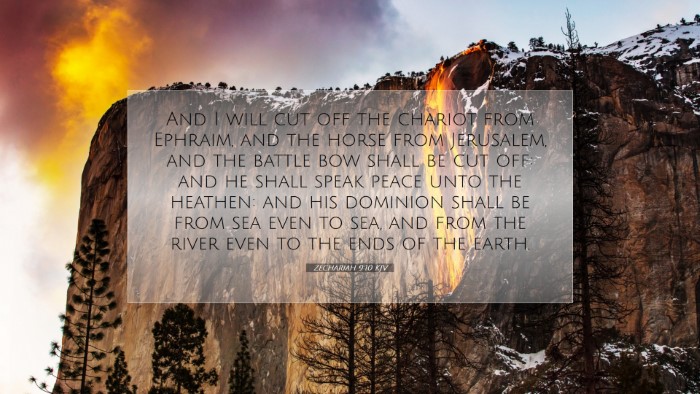Old Testament
Genesis Exodus Leviticus Numbers Deuteronomy Joshua Judges Ruth 1 Samuel 2 Samuel 1 Kings 2 Kings 1 Chronicles 2 Chronicles Ezra Nehemiah Esther Job Psalms Proverbs Ecclesiastes Song of Solomon Isaiah Jeremiah Lamentations Ezekiel Daniel Hosea Joel Amos Obadiah Jonah Micah Nahum Habakkuk Zephaniah Haggai Zechariah MalachiZechariah 9:10
Zechariah 9:10 KJV
And I will cut off the chariot from Ephraim, and the horse from Jerusalem, and the battle bow shall be cut off: and he shall speak peace unto the heathen: and his dominion shall be from sea even to sea, and from the river even to the ends of the earth.
Zechariah 9:10 Bible Commentary
Commentary on Zechariah 9:10
Zechariah 9:10 states:
"And I will cut off the chariot from Ephraim, and the horse from Jerusalem, and the battle bow shall be cut off: and he shall speak peace unto the heathen: and his dominion shall be from sea even to sea, and from the river even to the ends of the earth."
This verse is rich in prophetic significance and contains promises that extend beyond the immediate context of Zechariah’s time. Below is a detailed exploration of this verse using insights from noted public domain commentaries.
1. The Context of Zechariah's Prophecy
Zechariah’s ministry occurred in the post-exilic period, aimed at encouraging the returned remnant of Judah. During this time, the people were struggling to rebuild their society and faith. The prophetic words in chapters 9-14 are delivered against a backdrop of hope and restoration.
2. The Symbolic Meaning of Chariots and Horses
Matthew Henry discusses the removal of the chariot and horse, symbols associated with military power and strength. By declaring that He will cut off these instruments of war, God signifies a shift from reliance on military might to the establishment of His peace.
- Military Symbols: Chariots and horses represent human strength and war, which God will eliminate in favor of divine peace.
- Divine Peace: The phrase "speak peace unto the heathen" suggests that God’s purpose transcends Israel and includes a message of peace to all nations.
3. The Messianic Implication
Both Albert Barnes and Adam Clarke recognize this prophecy’s direct reference to the Messiah. The "he" who will “speak peace” is interpreted as Christ, who fulfills this aspect of prophecy in His earthly ministry.
- Royal Peace: The establishment of peace indicates the reign of the Messiah, who would usher in a time of spiritual as well as political peace.
- Universal Reign: The dominion mentioned in the latter part of the verse signifies that Christ's reign will be universal, encompassing "from sea even to sea."
4. The Nature of Christ’s Kingdom
Henry asserts that the kingdom of Christ is characterized by peace rather than war. This highlights the central theme of the New Testament where Christ is proclaimed as the Prince of Peace (Isaiah 9:6).
- From River to Sea: The mention of the "river" and “the ends of the earth” indicates that His rule is not limited geographically but is intended to reach all of creation.
- Fulfillment in the Church: The New Testament church embodies this peace, preaching the Gospel to every nation and extending the reign of Christ through spiritual means rather than military conquests.
5. Theological Implications of Peace
This verse speaks profoundly to the nature of God’s Shalom. Adam Clarke points out that the peace Christ offers is holistic, addressing spiritual, emotional, and social dimensions.
- Spiritual Peace: Believers are invited into a reconciled relationship with God through faith in Christ.
- Social Peace: The community of believers is called to be agents of peace, reflecting the nature of Christ in their interactions.
6. Application for Today’s Believers
For pastors, students, theologians, and scholars, this verse serves as a reminder of the nature of God’s kingdom. It challenges believers to be advocates of peace in a world often characterized by conflict.
- Peacemakers: As followers of Christ, we are called to embody the peace He brings (Matthew 5:9).
- Global Mission: The text encourages the church to engage in global missions, spreading the message of peace to the ends of the earth.
7. Conclusion
Zechariah 9:10 is a profound prophecy that encompasses themes of divine peace, the messianic reign of Christ, and the global scope of His kingdom. The insights from public domain commentaries enhance our understanding, urging us to recognize the transformative power of peace in our lives and in our ministry.
May this verse inspire new generations of believers to pursue a life that reflects the peace of Christ and engages actively in the advancement of His kingdom both near and far.


